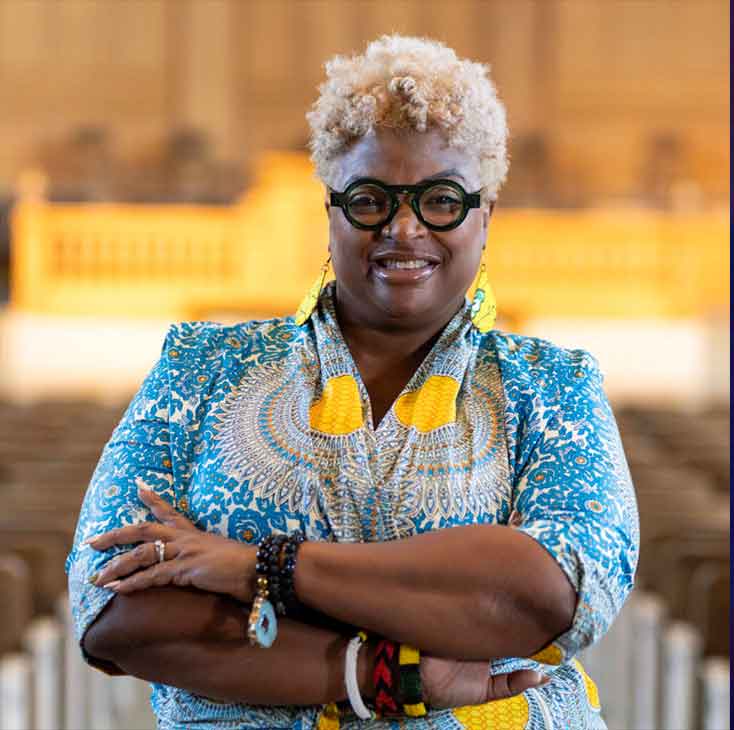Rev. Dr. Melva Sampson: ‘Healing Must Happen Beyond the Struggle’
Rev. Dr. Melva L. Sampson didn’t inherit a pulpit—she created one. The ordained minister and professor of preaching and practical theology at Wake Forest University has emerged as a leading voice for Black spiritual innovation, communal healing, and radical reimagining of faith—outside of the systems that have long tried to silence people like her.

By Stacy M. Brown | BlackPressUSA.com Senior National Correspondent
Rev. Dr. Melva L. Sampson didn’t inherit a pulpit—she created one. The ordained minister and professor of preaching and practical theology at Wake Forest University has emerged as a leading voice for Black spiritual innovation, communal healing, and radical reimagining of faith—outside of the systems that have long tried to silence people like her. “I’m a product of the Black church,” Dr. Sampson said. “That’s where I trace my community involvement—youth ministry, usher board, choir, youth revivals. I learned to speak extemporaneously before the congregation. We went into the community to volunteer, to collect goods, to visit senior homes. I watched my grandmother as a member of the JD Morton Missionary Society. My mother kept an open house, always someone boarding with us, always someone in need. This is in my blood. This is in my DNA.” Her theology is rooted in Ubuntu, the Southern African philosophy recognizing shared humanity. “If I ask you how you slept and you say, ‘Not well,’ then I didn’t sleep well either,” she said. “Our lived experiences are inextricably linked.”
Dr. Sampson’s path to ministry didn’t come through family lineage or denominational inheritance. “I didn’t grow up knowing I came from a line of preachers,” she said. “Later, I learned I had a great aunt who was a traveling evangelist in early 20th century South Georgia and North Florida. Her sister was a healer, what we called a fire talker. People brought their sick to her. But I didn’t come from a tradition of pulpits being passed down. That’s not my legacy.” Instead, she came through the back door of ministry—through community, service, and healing. “I ended up getting the credentials—seminary, ordination—but it was service that led me,” Dr. Sampson related. “I’ve been very effective, especially for those who’ve been iced out of traditional systems. Ministry is a system, and it often marginalizes voices that deserve to be heard.” In 2016, she founded Pink Robe Chronicles, a digital hush harbor that elevates sacred Black wisdom through storytelling, spiritual formation, and liberating faith practices. “It’s a beautiful practice to honor, restore, and elevate Black folks’ sacred memory,” she stated. “It’s rooted in womanist theology and sacred memory. My ministry creates spaces of healing, rest, resistance, joy, and justice.” Dr. Sampson also co-founded the One Love Festival, which uplifts African diasporic history and culture through innovation, entrepreneurship, and spiritual wellness. “I’ve created new modes of being by stepping away from the traditional path,” she remarked. “This is ministry in exile. It’s creating something out of nothing. And people have been helped by it.”
When asked what message she has for people struggling under what she called an unjust administration, as services are cut and prices rise, Dr. Sampson pointed to ancient wisdom. “I believe it’s Jeremiah 6:16— ‘Follow the ancient paths.’ That’s what we need now,” she asserted. “While this moment may feel new for some, for others—like my generation, Gen X—we’ve seen economic hardship before. But my children haven’t. So, we return. We return to the land. We return to cooperative economics, collective work, and responsibility.” She called on people to organize, pool resources, and resist isolation. “If it happens to one of us, it’s happened to all of us,” Dr. Sampson insisted. “We fight at the policy level while returning to our roots. Grow your own food. Build collective cooperatives. See yourself in others.”
Dr. Sampson also addressed those on the front lines of economic justice movements like the Target boycott. “Keep your hand on the plow and hold on,” she said. “These movements take time. Western society has us believing that you protest today, and change comes tomorrow. But a seed planted doesn’t bear fruit immediately. The harvest might not come this season, it might not come for seven generations. But that’s still our work.” She drew on Hebrews 11, referencing the ‘hall of faith’—those who saw the promise but never lived to experience it. “They saw it in the distance and greeted it,” she said. “Dr. King didn’t see what we now live. Brother Malcolm didn’t see it. But they didn’t stop. They were Afrofuturists. They imagined us.”
Dr. Sampson warned against complacency and what she called “comfort in captivity,” particularly where corporations profit off the Black community while retreating from equity. “If it requires a minor discomfort for a collective win, we must choose discomfort,” she offered. “These corporations respond to bottom lines. They take our dollars for granted.” For those seeking to follow or support her work, Dr. Sampson directs people to www.1lovefestival.com, www.drmelvasampson.com, and on Instagram and Facebook at Pink Robe Chronicles and Melva Sampson. “We have to consider healing beyond our struggle,” she said. “We honor our pain, but we’re not married to it. Our existence begins in brilliance, not bondage.”









